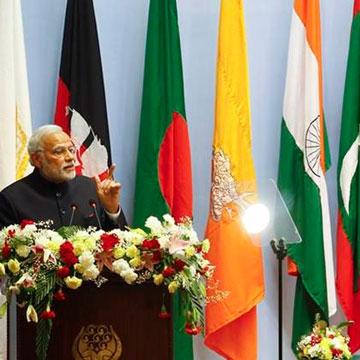 New Delhi:
New Delhi: A day after India announced it will not attend the 19th SAARC summit in Islamabad in November, Afghanistan, Bangladesh and Bhutan have conveyed to Nepal, the chair of SAARC, that they too will not be able to attend the summit.
All three countries, in different ways, blamed Pakistan for the current atmosphere and said it was not conducive for the summit. A formal announcement of the summit postponement will be made in Kathmandu in the next few days, since key government interlocutors in Nepal are not present in Kathmandu.
In a statement, the Nepal Foreign Ministry said: “The government of Nepal has received communications from the SAARC secretariat transmitting the diplomatic notes from four SAARC member states namely, Afghanistan, Bangladesh, Bhutan and India in which they have conveyed their inability to participate in the 19th SAARC summit scheduled for November 9 and 10 in Islamabad, stating that the current regional environment is not conducive to the successful holding of the summit.”
“We have taken this development seriously. As the current chair of SAARC, the government of Nepal strongly urges that a conducive environment be created for the 19th SAARC summit soon by ensuring the participation of all member states in line with the spirit of the SAARC charter,” the Ministry stated.
In its letter to the SAARC secretariat, Bangladesh said, “The growing interference in the internal affairs of Bangladesh by one country has created an environment which is not conducive to the successful hosting of the 19th SAARC Summit in Islamabad in November 2016.”
“Bangladesh, as initiator of the SAARC process, remains steadfast in its commitment to regional cooperation, connectivity and contacts but believes that these can only go forward in a more congenial atmosphere. In view of the above, Bangladesh is unable to participate in the proposed Summit in Islamabad.”
Pakistan has been critical of the war crimes trial in Bangladesh, initiated by Bangladesh Prime Minister Sheikh Hasina, and has repeatedly criticised Dhaka for the hanging of Jamaat-e-Islami leaders. In fact, Bangladesh did not send its Home Minister for the SAARC Interior Ministers’ meeting in Islamabad last month, which was attended by Home Minister Rajnath Singh.
Bangladesh government sources told The Indian Express that Hasina, who is likely to visit Goa next month for the BRICS-BIMSTEC outreach summit, would have skipped the SAARC summit in Islamabad, and was planning to send the Bangladesh President instead.
However, the turn of events in Kashmir and then, Uri, led Delhi to exchange notes with Dhaka through diplomatic channels before the decision to boycott the SAARC summit was taken.
Afghanistan also conveyed to the SAARC chair that “due to increased level of violence and fighting as a result of imposed terrorism on Afghanistan, the President of Afghanistan Mohammad Ashraf Ghani with his responsibilities as the Commander in Chief will be fully engaged, and will not be able to attend the Summit.”
Kabul’s use of phrase “imposed terrorism on Afghanistan” is the result of its increasing frustration with Islamabad. Ghani, who visited India early September and met Prime Minister Narendra Modi, had conveyed his disappointment with Pakistan’s establishment, especially after the talks with Taliban did not make progress.
Following the Uri attack, when Ghani called Modi to convey his condolences, he also indicated his support to India for its actions against terrorism. This was a strong signal of unequivocal support from Kabul to Delhi. Thereafter, Afghan diplomats and South Block also exchanged notes.
Bhutan, which was not directly affected by the terrorist attacks from Pakistan-based groups, conveyed its inability to attend the summit, since it wanted to show its solidarity with South Block.
While reaffirming Bhutan’s strong commitment to the SAARC process and strengthening of regional cooperation, Thimphu’s missive to Nepal notes “the concern of the Royal Government of Bhutan on the recent escalation of terrorism in the region, which has seriously compromised the environment for the successful holding of the 19th SAARC Summit in Islamabad in November 2016”.
Further, its said, “the Royal Government of Bhutan shares the concerns of some of the member countries of SAARC on the deterioration of regional peace and security due to terrorism and joins them in conveying our inability to participate in the SAARC Summit, under the current circumstances.”
Sources privy to the decision-making process said there was “intense engagement with all three Capitals, and our top diplomats were engaged in a dialogue with their counterparts”, before all four countries decided to convey their decision to the SAARC chair, Nepal.
India’s announcement was made by the Ministry of External Affairs (MEA) on Tuesday which said “increasing cross-border terrorist attacks in the region and growing interference in the internal affairs of member states by one country have created an environment that is not conducive to the successful holding of the 19th SAARC Summit in Islamabad”. MEA spokesperson Vikas Swarup had also tweeted: “Regional cooperation and terror don’t go together.”
This is the first time four countries will boycott a SAARC summit, and boycott of a SAARC summit by any head of government means that the summit has to be postponed.
 New Delhi: A day after India announced it will not attend the 19th SAARC summit in Islamabad in November, Afghanistan, Bangladesh and Bhutan have conveyed to Nepal, the chair of SAARC, that they too will not be able to attend the summit.
New Delhi: A day after India announced it will not attend the 19th SAARC summit in Islamabad in November, Afghanistan, Bangladesh and Bhutan have conveyed to Nepal, the chair of SAARC, that they too will not be able to attend the summit.